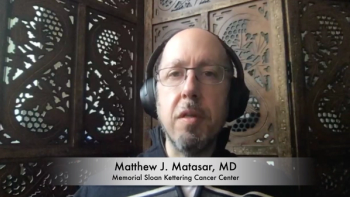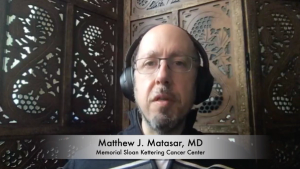
Developing odronextamab combinations following CAR T-cell therapy failure may help elicit responses in patients with diffuse large B-cell lymphoma.

Your AI-Trained Oncology Knowledge Connection!


Developing odronextamab combinations following CAR T-cell therapy failure may help elicit responses in patients with diffuse large B-cell lymphoma.

Cytokine release syndrome was primarily low or intermediate in severity, with no grade 5 instances reported among those with diffuse large B-cell lymphoma.

An expert from Rutgers Cancer Institute discusses ongoing research for mosunetuzumab in relapsed/refractory follicular lymphoma, as well as the importance of deploying the agent in the community setting.

An expert from Rutgers Cancer Institute indicates that mosunetuzumab may limit unmet needs commonly associated with CAR T-cell therapy such as cost, tolerability, and access.

An expert from Rutgers Cancer Institute reviews data that lead to the approval of mosunetuzumab for patients with relapsed/refractory follicular lymphoma.

Rituximab-subcutaneously is associated with significantly reduced chair time vs rituximab-intravenously in a US oncology setting. Widespread adoption would be expected to improve practice efficiency and patient access to care, and to reduce health care resource burden.

The lymphoma expert discussed how adding copanlisib to rituximab improved progression-free survival, while demonstrating a manageable safety profile in patients with relapsed indolent non-Hodgkin lymphoma.

The lymphoma expert offered highlights from the meeting, with hopes that more treatment options will be available for patients with lymphoma.

The lymphoma expert discussed how the addition of copanlisib to rituximab may add another treatment option for patients with relapsed indolent B-cell lymphomas.

Dr. Yee and his colleagues have offered a comprehensive overview of the epidemiology, diagnosis, and therapy of both gallbladder carcinoma and cholangiocarcinoma. They correctly note the infrequency of these two neoplasms, with approximately 7,500 cases diagnosed in the United States each year, two-thirds of which are gallbladder cancer. Unfortunately, neither the incidence rate nor prognosis of these neoplasms has changed substantially since biliary tumors were last reviewed in this journal[1]; the median 5-year survival rate has remained at 5%. Some progress has been made, however, in our understanding of the etiology of cancers of the biliary tract, and a body of literature continues to emerge exploring the question of how best to approach screening and prophylaxis in high-risk populations.

Published: January 15th 2023 | Updated:

Published: April 27th 2021 | Updated:

Published: December 21st 2024 | Updated:

Published: January 19th 2023 | Updated:

Published: December 22nd 2021 | Updated:

Published: April 23rd 2021 | Updated: